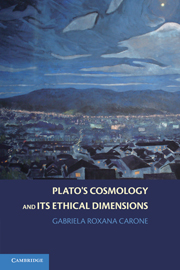Book contents
- Frontmatter
- Contents
- Preface
- Plato's Cosmology and Its Ethical Dimensions
- 1 Introduction
- 2 Demiurgy in the Timaeus
- 3 Cosmic God and Human Reason in the Timaeus
- 4 Creating Mixtures in the Philebus
- 5 Happiness in the Universe of the Philebus
- 6 Reversing the Myth of the Politicus
- 7 Cosmic and Human Drama in the Politicus
- 8 Laws X: First Causes and the Origin of Evil
- 9 Conclusion
- Notes
- Bibliographical References
- Index Locorum
- General Index
7 - Cosmic and Human Drama in the Politicus
Published online by Cambridge University Press: 10 May 2010
- Frontmatter
- Contents
- Preface
- Plato's Cosmology and Its Ethical Dimensions
- 1 Introduction
- 2 Demiurgy in the Timaeus
- 3 Cosmic God and Human Reason in the Timaeus
- 4 Creating Mixtures in the Philebus
- 5 Happiness in the Universe of the Philebus
- 6 Reversing the Myth of the Politicus
- 7 Cosmic and Human Drama in the Politicus
- 8 Laws X: First Causes and the Origin of Evil
- 9 Conclusion
- Notes
- Bibliographical References
- Index Locorum
- General Index
Summary
The previous chapter argued for a view of the myth of the Politicus according to which, even on a literal reading, we are currently living in a period governed by god. In this respect, the letter of the text has been shown to be consistent with the cosmological accounts of other dialogues, which gives us good reason to suppose that Plato does after all mean to present our universe as one under divine guidance. And this, in turn, has enabled us to make better sense of the possibility of human and political progress as allowed in the rest of the Politicus. A further point to discuss now, however, is how literally the myth should be taken in other respects, and whether it does not still deserve other levels of analysis that could complementarily enrich and enlighten our understanding of its function in the dialogue. It is prima facie clear that the guise of the myth is cosmological, but how much cosmological significance does it have?
Positions on this point have often been extreme. Thus, the myth has sometimes been treated either as a digressive and separate piece of cosmological doctrine, or as a rather lengthy tale fashioned for the political purposes of the dialogue but deprived of great cosmological importance. In this chapter I wish to undertake a more integrated analysis, by stressing the cosmological content of the myth and, against that background, exploring further its ethical and political implications and its relevance to the general political purpose of the dialogue.
- Type
- Chapter
- Information
- Plato's Cosmology and its Ethical Dimensions , pp. 146 - 161Publisher: Cambridge University PressPrint publication year: 2005

